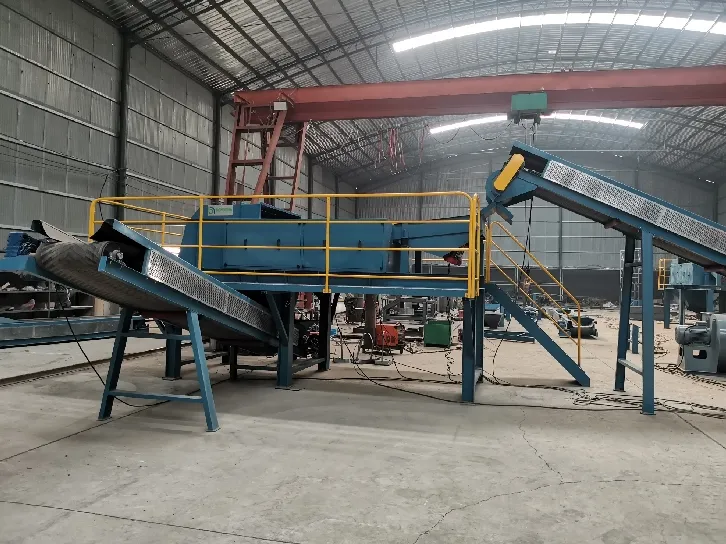

Nov . 13, 2024 16:50 Back to list
Eddy Current Separator for Aluminium Recycling
In the realm of waste management and recycling, the recovery of metals plays a critical role in promoting sustainability and conserving resources. Among various methods used for metal separation, the Eddy Current Separator (ECS) has gained prominence due to its efficiency and effectiveness, particularly in the recycling of non-ferrous metals like aluminium.
Understanding Eddy Current Separation
The principle behind Eddy Current Separation is based on electromagnetic induction. When a conductive material, such as aluminium, passes through a rapidly changing magnetic field, it generates eddy currents within the material itself. These eddy currents create their own magnetic field, which interacts with the external magnetic field, resulting in a repulsion effect that effectively separates the aluminium from other materials. This makes ECS an ideal solution for separating non-ferrous metals from mixed waste streams, including household waste, industrial scrap, and electronic waste.
Advantages of Eddy Current Separator for Aluminium
1. High Efficiency ECS systems are designed to maximize the recovery of aluminium, ensuring that a significant portion of the metal is extracted from the waste stream. This high efficiency translates to increased profitability for recycling facilities.
2. Low Operating Costs Compared to traditional separation methods, Eddy Current Separators often have lower operational costs. They require less manual labor and can process larger volumes of material at a faster rate, enhancing overall productivity.

3. Minimal Environmental Impact By improving aluminium recovery rates, ECS contributes to reducing the environmental impact associated with mining and refining new aluminium. Recycling aluminium saves energy and reduces greenhouse gas emissions, making ECS a valuable tool in the pursuit of sustainable practices.
4. Versatility Eddy Current Separators can be integrated into various recycling processes and can effectively handle different waste materials. Whether it is in the recycling of beverage cans, automotive parts, or electronic components, ECS systems are adaptable to various applications.
Challenges and Considerations
Despite the advantages, there are challenges that come with the implementation of Eddy Current Separators. One significant consideration is the design and configuration of the separator. The performance of ECS systems can be influenced by factors such as the size and shape of the aluminium pieces, their conductivity, and the surrounding material composition. Therefore, accurate calibration and adjustment of the system is crucial to ensure optimal performance.
Additionally, pre-sorting of materials may be necessary to enhance the efficiency of the ECS. Removing impurities and non-conductive materials beforehand can prevent disruptions during the separation process and improve overall yield.
Conclusion
The Eddy Current Separator represents a monumental leap forward in the technology used for aluminium recycling. Its ability to effectively separate non-ferrous metals not only boosts the efficiency of recycling programs but also supports the broader goals of environmental sustainability and resource conservation. As the demand for recycled aluminium continues to rise, the importance of ECS in modern recycling operations will undoubtedly grow. By harnessing the power of this innovative technology, industries can move towards a more circular economy, reducing reliance on virgin materials and, in turn, mitigating the environmental impacts associated with metal production. In a world increasingly focused on sustainability, the Eddy Current Separator stands out as a vital component in the recycling landscape, driving the future of aluminium recovery.
Latest news
The Future of Metal Recycling: Revolutionizing Waste Management
NewsMay.14,2025
Optimizing Waste with Recycling Lines
NewsMay.14,2025
Municipal Solid Waste Sorting Line: Revolutionizing Waste Management
NewsMay.14,2025
Metal Shredders: Essential Tools for Efficient Recycling
NewsMay.14,2025
Maximize Your Profits with a Copper Wire Granulator
NewsMay.14,2025
Home Metal Shredder: A Smart Choice for Your Home Recycling Needs
NewsMay.14,2025